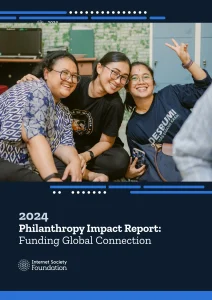Local technical communities create and defend a stronger, more resilient Internet.
The Sustainable Technical Communities funding program supports the organization of technical events, in order to enable strong and sustainable technical communities.
Program Objectives
- Contribute to the exchange of knowledge and best practices on technical topics related to the development and evolution of the Internet, including peering.
- Contribute to strengthening technical communities’ position to offer advice on the implementation of Internet-related policies and regulations, and to serve as a focal point on technical expertise for their identified ecosystem(s).
- Support technical communities to increase technical expertise in their ecosystem(s) through trainings, content, and best practices on governance and administrative operations.
- Strengthen the impact of the Internet Society Foundation’s mission through open and collaborative dialogue and follow-on actions from funded events.
Funding can cover costs associated with hosting the event (space rental, catering) and/or costs associated with encouraging diverse participation (publicity, outreach).
What is a Technical Community?
A technical community is a group of people with working knowledge of the underlying technologies that make the Internet function. Technical communities gather at regular intervals with the intention to collaboratively build, promote, and defend an open, globally connected, trustworthy, and secure Internet by sharing knowledge and best practices related to these technologies. To achieve their goals, technical communities can carry out capacity building activities, leverage partnerships with relevant actors, offer advice on the implementation of Internet-related policies, and serve as focal points on technical expertise for their local or regional ecosystem. Some examples of technical communities include Network Operator Groups (NOGs), National Research and Education Networks (NRENs), country-code Top Level Domain Operators (ccTLDs), CSIRTs, among others.
Eligibility and Review Process
Sustainable technical community event funding is available to organizations who are directly involved in the planning and execution of an event. In addition, in order to receive the funding, organizations must have an official bank account in their name (based on their legal registration).
Applications must be submitted at least 8-10 weeks before the event’s start date. The Internet Society Foundation requires sufficient time to review, conduct due diligence, make a determination about eligibility and alignment, and complete administrative duties for processing funding requests.
Selection Criteria
The selection criteria against which staff will review eligible applications are:
- The proposed event supports the program objectives of the sustainable technical communities funding
- The proposed event effectively responds to a clearly identified need and issue related to Internet development or peering within the relevant communities
- The applicant demonstrates the necessary knowledge and experience to accomplish the event goals
- The applicant has described and identified relevant objectives that demonstrate sufficient expected outcomes relative to the funding level
- If previously funded, has completed and submitted all required reports for previous grants and sponsorships.
Applicants must submit a current agenda showing the confirmed event date and details (including proposed workshops, names of invited panelists and organizations, etc.)
Funding
Funding of up to $6,000 USD is available on an annual basis (per calendar year):
- One per organization for local or national events
- Two per organization for regional events
Please note that on the application form you will be asked to provide a budget for how you will spend the money you are requesting from the Internet Society Foundation.
How to Apply
Applications must be submitted online using the Internet Society Foundation’s grant management platform. Only applications submitted online will be considered.
Incomplete applications, applications that do not meet eligibility requirements, and applications that do not allow sufficient time for review will not be considered.
Sample Projects
Some examples of events that can be supported by this program include:
- The launch of a new technical community in a country, such as a national Network Operators Group
- A technical community gathering to discuss current issues and technological developments related to the design and deployment of computer networks
- A technical community gathering to share best practices in routing security
These examples are meant to provide context for the program. Proposals are not limited to these specific events.
This program does not support the following initiatives:
- Digital literacy trainings
- Sensitizations and outreach programs oriented towards a general public
- “Train-the-Trainer” programs which aim to equip participants with basic digital skills or to carry out end-user support (configuring home devices, explaining safe Internet access, etc.)
- Policy and technology discussion forums that are not related to the underlying technical infrastructure of the Internet.
- Trainings or capacity-building initiatives that benefit a single organization, such as a staff training for a charity.
Organizations interested in these kinds of projects are encouraged to contact their local Internet Society chapter to explore potential collaboration.
Reporting
The recipient organization will submit a narrative report about their event directly to the Foundation using the online Fluxx platform 30 days after the event.
Questions?
If you have questions about this program or the application process, contact us.
Due to limited staff capacity, we cannot guarantee a response to questions about the application process received after the end of the working day, one day before the application window closes.
If you’d like to learn more about network operations and peering, we provide a group of online courses to anyone interested in strengthening their knowledge on these topics: Fundamentals of Designing and Deploying Computer Networks, Introduction to Network Operations, Advanced Network Operations 2.0, and IXP 2.0.

